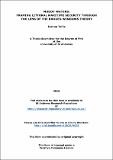Files in this item
Muddy waters : framing littoral maritime security through the lens of the Broken Windows theory
Item metadata
| dc.contributor.advisor | Lehr, Peter | |
| dc.contributor.author | Tallis, Joshua | |
| dc.coverage.spatial | vii, 311 p. | en_US |
| dc.date.accessioned | 2016-06-22T08:24:43Z | |
| dc.date.available | 2016-06-22T08:24:43Z | |
| dc.date.issued | 2016-12-01 | |
| dc.identifier | uk.bl.ethos.690331 | |
| dc.identifier.uri | https://hdl.handle.net/10023/9028 | |
| dc.description.abstract | This dissertation explores the growing field of study around Maritime Security. While an increasingly common sub-heading in American naval strategy documents, maritime security operations are largely framed around individual threats (i.e. counter-piracy, counter-terrorism, counter-narcotics). Here, we endeavor to explore how a seemingly disparate set of transnational issues fit into a more coherent framework to give greater theoretical substance to the notion of Maritime Security as a distinct concept. In particular, we examine, as our research question, whether the Broken Windows theory, a criminological construct of social disorganization, provides the lens through which to theorize maritime security in the littorals. By extrapolating from criminology, this dissertation engages with a small but growing impulse in studies on insurgencies, terrorism, and piracy to look beyond classic theories of security to better understand phenomena of political violence. To evaluate our research question, we begin by identifying two critical components of the Broken Windows theory, multidimensionality and context specificity. Multidimensionality refers to the web of interrelated individuals, organizations, and infrastructure upon which crime operates. Context specificity refers to the powerful influence of an individual or community’s environment on behavior. These two themes, as explored in this dissertation, are brought into stark relief through an application of the Broken Windows theory. Leveraging this understanding of the theory, we explore our research question by employing process-tracing and detailed descriptions across three case studies (one primary and two illustrative)—the Caribbean Basin, the Gulf of Guinea, and the Straits of Malacca and Singapore. In so doing, we demonstrate how applying the lens that Broken Windows provides yields new and interesting perspectives on maritime security. As a consequence, this dissertation offers an example of a theoretical framework that provides greater continuity to the missions or threats frequently binned under the heading of maritime security, but infrequently associated with one another in the literature. | en_US |
| dc.language.iso | en | en_US |
| dc.publisher | University of St Andrews | |
| dc.rights | Attribution-NonCommercial-NoDerivatives 4.0 International | * |
| dc.rights.uri | http://creativecommons.org/licenses/by-nc-nd/4.0/ | * |
| dc.subject | Maritime security | en_US |
| dc.subject | Broken Windows theory | en_US |
| dc.subject | Community policing | en_US |
| dc.subject | Everyday security | en_US |
| dc.subject | Good order at sea | en_US |
| dc.subject | Piracy | en_US |
| dc.subject | Terrorism | en_US |
| dc.subject | Trafficking | en_US |
| dc.subject | United States Navy | en_US |
| dc.subject | Coast Guard | en_US |
| dc.subject | Caribbean | en_US |
| dc.subject | Gulf of Guinea | en_US |
| dc.subject | West Africa | en_US |
| dc.subject | Southeast Asia | en_US |
| dc.subject | Strait of Malacca | en_US |
| dc.subject | Littoral | en_US |
| dc.subject | Maritime strategy | en_US |
| dc.subject | Naval strategy | en_US |
| dc.subject | Mahan | en_US |
| dc.subject | Corbett | en_US |
| dc.subject.lcc | VK203.T2 | |
| dc.subject.lcsh | Coastwise shipping--Security measures | en_US |
| dc.subject.lcsh | Merchant marine--Security measures | en_US |
| dc.subject.lcsh | Maritime terrorism--Prevention | en_US |
| dc.subject.lcsh | Piracy--Prevention | |
| dc.title | Muddy waters : framing littoral maritime security through the lens of the Broken Windows theory | en_US |
| dc.type | Thesis | en_US |
| dc.type.qualificationlevel | Doctoral | en_US |
| dc.type.qualificationname | PhD Doctor of Philosophy | en_US |
| dc.publisher.institution | The University of St Andrews | en_US |
| dc.publisher.department | School of International Relations, Centre for the Study of Terrorism and Political Violence | en_US |
The following licence files are associated with this item:
This item appears in the following Collection(s)
Except where otherwise noted within the work, this item's licence for re-use is described as Attribution-NonCommercial-NoDerivatives 4.0 International
Items in the St Andrews Research Repository are protected by copyright, with all rights reserved, unless otherwise indicated.


